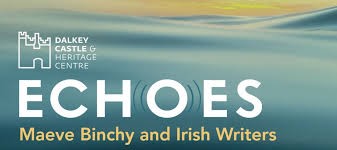A Storied Journey Through Dublin, Ireland
Friday, April 26, 2024
(0 Comments)
Posted by: Mary Beth Sammons
It’s all about the books and literature in Dublin. During a recent two-day whirlwind stop in Ireland’s capitol city, we were on a mission to explore the rich narratives and literary history. Here, in the city cleaved by the River Liffey, three of the bridges are named for writers: James Joyce, Sean O'Casey and Samuel Beckett, and the narratives and storytelling are everywhere. Trinity College Library For two days, we trekked the streets of Dublin, (racking up 28,000 steps, or 12-plus miles daily on our Fitbits). We followed the famous trails of James Joyce and the narrative of Ulysses. We were transported centuries ago to 800 A.D. when monks transcribed the Bible into manuscripts —one of the most famous, the Book of Kells, is located at the Old Library at Trinity College. We just closed our eyes and inhaled the musty aroma of the 200,000-plus books stored there. 
Dublin is an unfolding theater of literature: It’s a UNESCO City of Literature, holds the International Literature Festival Dublin in May, which sees some of the biggest authors from around the world descend on the city to share their wisdom and wit, and celebrates an unofficial literary holiday every 16th of June, known as Bloomsday, in honor of Joyce's, Ulysses.  Oscar Wilde Strolling through St. Stephen’s Green, a historical park and garden located in the center of Dublin city, we bump into a bronze bust of Joyce, dated 1982, facing the writer’s alma mater, the University College Dublin. Nearby, we discovered Oscar Wilde’s statue not far from his family home in Merrion Square. 
Shelbourne Hotel On more of a celebrity haunt, we ducked into the 5-star Shelbourne Hotel, which also is featured in Ulysses and has hosted famous authors including Rudyard Kipling and Seamus Heaney. It is a more current hangout of Sally Rooney, author of Conversations with Friends and Normal People. Her alma mater, Trinity College, serves as the backdrop for these novels and their television adaptations. 
The Winding Stairs Restaurant and Bookshop
In search of W.B. Yeats, we dined at The Winding Stair restaurant on Ormond Quay, which takes its name from one of his poems and opens with the lines: “My Soul. I summon to the winding ancient stair;
Set all your mind upon the steep ascent,
Upon the broken, crumbling battlement,
Upon the breathless starlit air,
'Upon the star that marks the hidden pole;
Fix every wandering thought upon
That quarter where all thought is done” The Winding Stair Bookshop & Cafe became a famous Dublin landmark in the 1970s and 1980s. Overlooking the Ha’penny bridge, it was a popular meeting place for writers, musicians and artists. It was a well-known hub for debate and creativity with many poems written, novels penned and movies shot within its walls. The Winding Stair Bookshop is one of the oldest surviving independent bookshops in Dublin.
 Riding the DART to Dalkey in South Dublin, we stumbled on the birthplace of Maeve Binchy, who worked as a teacher and journalist before becoming a novelist. A storied journey We discovered that when in Dublin, everyone has a story and a budding novel within them. Our final stop was The Church Café Bar, the former St. Mary’s Church of Ireland, built in the beginning of the 18th Century. It was the first classical parish church in the city and the site of Guinness Brewery founder Arthur Guinness’s marriage in 1791. The adjoining churchyard is the final resting place of philosopher Francis Hutcheson and the church was frequented by Jonathan Swift, author of Gulliver's Travels. Even on a short two-day trek, there’s no question that the Irish are natural storytellers. Evidence is everywhere that the Irish love nothing more than sharing the tales of Ireland, and their reverence for words, stories and poetry. This storytelling runs deep in Ireland and is tied to the oral tradition of the Celts who had no written language.
|
 Welcome to Narrative Mindworks!
Welcome to Narrative Mindworks!